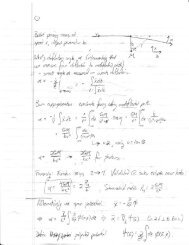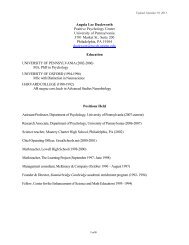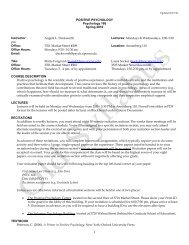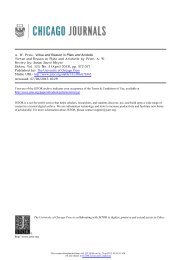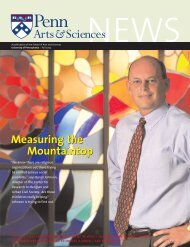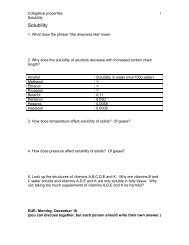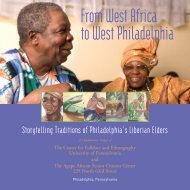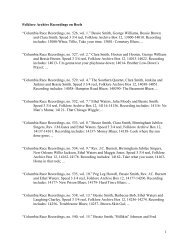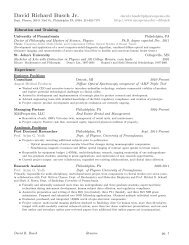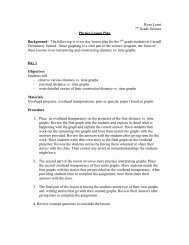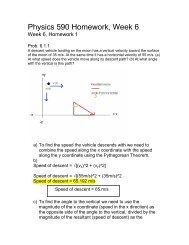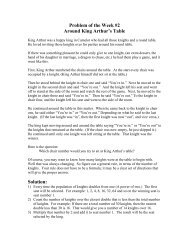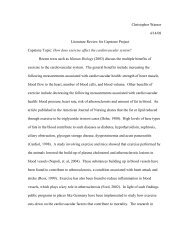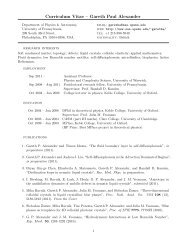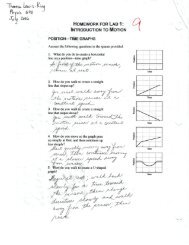PENN SUMMER - University of Pennsylvania
PENN SUMMER - University of Pennsylvania
PENN SUMMER - University of Pennsylvania
Create successful ePaper yourself
Turn your PDF publications into a flip-book with our unique Google optimized e-Paper software.
sPan 226 950 TBa regueiro<br />
Spanish Culture and Civilization<br />
Fulfills Cross-Cultural Analysis Course / Prerequisite(s): 2 years college Spanish<br />
or equivalent / Taught in Spanish<br />
A general introduction to the study <strong>of</strong> Spanish culture. This course<br />
is designed to help students understand the historical foundations <strong>of</strong><br />
contemporary Spanish society, its values and its institutions. The focus<br />
is on the principal events <strong>of</strong> Spanish history and the development <strong>of</strong><br />
political and social institutions from the Middle Ages to the present,<br />
with special emphasis on the major artistic and literary milestones<br />
that have marked the Spanish cultural legacy. Through this historical<br />
overview, students will also refine their knowledge <strong>of</strong> the physical<br />
and cultural geography <strong>of</strong> Spain.<br />
sPan 227 950 TBa lopez<br />
Contemporary Spain (from 1868 to the Present)<br />
Fulfills Cross-Cultural Analysis Course / Prerequisite(s): 2 years college Spanish<br />
or equivalent / Taught in Spanish<br />
In this course we study the main events, periods and policies that<br />
formed contemporary Spain. In the first half <strong>of</strong> the course we will<br />
study the historical conditions, including a review <strong>of</strong> the constitutional<br />
monarchy (1875–1923) and its dissolution in Primo’s dictatorship<br />
(1923–1931), followed by the second Republic and the Spanish Civil<br />
War (1936–1939). At this stage we will pay special attention to the<br />
international pressures that resulted in the defeat <strong>of</strong> the Republic followed<br />
by the advent <strong>of</strong> Franco’s dictatorship. The second part <strong>of</strong> the<br />
course concentrates on the study <strong>of</strong> Franco’s regime (1939–1975)<br />
and the transition to democracy (1979) as well as the consolidation<br />
<strong>of</strong> the monarchy and Spain’s integration into Europe.<br />
sPan 326 950 TBa staff<br />
Spanish Culture and Civilization<br />
Fulfills Cross-Cultural Analysis Course / Prerequisite(s): SPAN 219 at Penn or<br />
equivalent / Taught in Spanish<br />
A general introduction to the study <strong>of</strong> Spanish culture. This course<br />
is designed to help students understand the historical foundations <strong>of</strong><br />
contemporary Spanish society, its values and its institutions. The focus<br />
is on the principal events <strong>of</strong> Spanish history and the development <strong>of</strong><br />
political and social institutions from the Middle Ages to the present,<br />
with special emphasis on the major artistic and literary milestones<br />
that have marked the Spanish cultural legacy. Through this historical<br />
overview, students will also refine their knowledge <strong>of</strong> the physical<br />
and cultural geography <strong>of</strong> Spain.<br />
sPan 327 950 TBa lopez<br />
Contemporary Spain (from 1868 to the Present)<br />
Fulfills Cross-Cultural Analysis Course / Prerequisite(s): SPAN 219 at Penn or<br />
equivalent / Taught in Spanish<br />
In this course we study the main events, periods and policies that<br />
formed contemporary Spain. In the first half <strong>of</strong> the course we will<br />
study the historical conditions, including a review <strong>of</strong> the constitutional<br />
monarchy (1875–1923) and its dissolution in Primo’s dictatorship<br />
(1923–1931), followed by the second Republic and the Spanish Civil<br />
War (1936–1939). At this stage we will pay special attention to the<br />
international pressures that resulted in the defeat <strong>of</strong> the Republic followed<br />
by the advent <strong>of</strong> Franco’s dictatorship. The second part <strong>of</strong> the<br />
course concentrates on the study <strong>of</strong> Franco’s regime (1939–1975)<br />
and the transition to democracy (1979) as well as the consolidation <strong>of</strong><br />
the monarchy and Spain’s integration into Europe.<br />
LPs online Courses<br />
This courses are delivered in a fully online format in order to allow<br />
more flexibility for LPS students. Class sessions are <strong>of</strong>fered through a<br />
course website and include live lectures and interactive discussions<br />
through both direct messaging and voice over internet. Between classes,<br />
the learning experience is extended through assignments, threaded discussions<br />
and <strong>of</strong>fice hours. For additional information, please visit www.<br />
sas.upenn.edu/lps/online.<br />
Students registering for LPS Online courses are charged a $60 online<br />
course fee.<br />
Summer Session i<br />
MAY 24–JULY 2, 2010<br />
hiSTorY<br />
hIsT 201 936 MW 6:00pm–8:30pm rabberman<br />
History <strong>of</strong> Human Sexuality in the Pre-Modern<br />
West<br />
Men and boys in same-sex relationships in Ancient Greece; prostitutes<br />
and actors in Imperial Rome; love potions in Hellenistic Egypt; adulterers<br />
in medieval England; young betrothed couples in Renaissance<br />
Italy; accused witches in Reformation Germany—historians <strong>of</strong><br />
sexuality developed their understanding <strong>of</strong> sexuality in Premodern<br />
Europe through these examples. In this research seminar, we will<br />
discover how these historians deciphered primary sources, including<br />
course cases, literature, art, religious texts, and popular media, to<br />
address the following questions: Are sexual identities constructed by<br />
different cultures, rather than simply being determined biologically?<br />
What influence do social, economic, and political conditions have on<br />
societies’ definition <strong>of</strong> sexual roles? How have these societies used<br />
sexual norms to mark “natural” practices from “deviant” ones, and<br />
how are these norms connected to societies’ power structures? This<br />
class fulfills the major’s historical research requirement; students will<br />
write a 20–25 page research paper based on their critical analysis <strong>of</strong><br />
primary sources in translation, and will be led through this process by<br />
sequenced writing assignments.<br />
LPS OnLInE COURSES – <strong>SUMMER</strong> SESSIOn I • MAY 24–JULY 2, 2010 41



